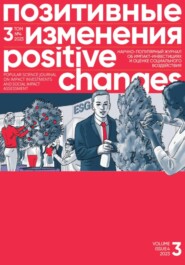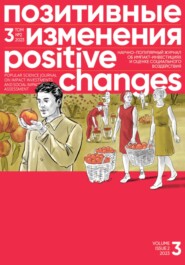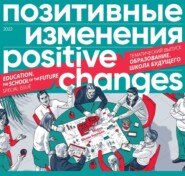По всем вопросам обращайтесь на: info@litportal.ru
(©) 2003-2024.
✖
Позитивные изменения. Том 2, №4 (2022). Positive changes. Volume 2, Issue 4 (2022)
Настройки чтения
Размер шрифта
Высота строк
Поля
Alexey Kuzmin, CEO of Process Consulting, received an award in the Personal Contribution to the Development of Social Projects and Programs Evaluation category for his development of the project and program evaluation market, active participation in evaluation method development programs, and educational activities on his professional blog.
Alexey Kuzmin has worked as an organizational development and program evaluation consultant since 1987. Member of the American Evaluation Association since 1999, member of the Russian Association of Program and Policy Evaluators. He has supervised the evaluation of more than 100 programs and projects in 20 countries.
What important things happened in the field of evaluation in Russia and the world in 2022? According to award winner Alexey Kuzmin, one of the notable events was the opening of the International Evaluation Academy[28 - International Evaluation Academy. (2022). Retrieved from: https://ieac.global/. (accessed 10.12.2022).].
“This is a global movement of volunteers seeking to increase the impact of evaluation on meaningful decision-making, the professionalization of evaluation, and its transformative impact. The academy is focused on innovation in the way evaluation is designed and used to solve complex economic, social, and environmental sustainability problems. The academy's board and advisory council includes several dozen specialists from all continents. It is planned to support fellows who will conduct development in priority areas for the academy.
I think that the academy has every chance to play an important role in the development of evaluation in the world,” believes Alexey Kuzmin.
If we talk about significant events in our country, the expert notes the PROOTSENKA club, whose online meetings are held monthly under the motto “Interesting Conversation in Good Company[29 - #PROOCENKU Alliance. (2022). Retrieved from: http://www.proocenku.club/. (accessed: 10.12.2022).].”
“The club's mission is to support a community of practitioners dedicated to integrating evaluation into the work of socially oriented organizations. Nothing is required to participate in the meetings except the desire. Education, level of training in evaluation, and practical experience are not important. The organizers of the club strive to choose topics that are important from a practical point of view, to give participants new information, to use a variety of formats of work, to maintain an informal positive atmosphere,” explains Alexey Kuzmin.
THE “REVOLUTION” IN EMPIRICAL RESEARCH
Elena Avramenko was awarded in the Development of Methodology of Social Projects Evaluation category for the development and elaboration of methods for economic assessment of social impact and a series of publications in the Positive Changes Journal.
Elena Avramenko is one of the authors of the methodological recommendations “Development of a model for assessing the socio-economic Impact of NPO projects[30 - Avramenko, E., Gladkikh, N., Vanchikova, S. & Vainer, V. (2021). Development of a model for assessing the socio-economic Impact of NPO projects. Methodological guidelines. Moscow: Gladway Foundation of Development of Media Projects and Social Programs. Retrieved from: https://impact.ngo.ru/library/view/53. (accessed: 10.12.2022).].” The guide describes possible strategies for conducting socio-economic analysis of the impact of NPO projects at the level of describing the steps for “manual” calculations (on savings of state funds, characteristics of the quality of life of beneficiaries, etc.).
Elena Avramenko has been a regular contributor to the Positive Changes Journal since its first issue in December 2021[31 - Avramenko, E. (2022). The 2021 Nobel Prize in Economics: a new step in accessing the social impact. Positive Changes, 1(1), 58–67.].
What set the vector for the development of the impact assessment methodology for all of 2022? Such an event, according to the winner of the prize, was the presentation of the Nobel Prize to three scientists: Guido Imbens, David Card, and Joshua Angrist, “for their methodological contributions to cause and effect analysis.” The methodology proposed by the scientists makes it possible to find variations in the data of a “natural” experiment, which can give reliable results in assessing the influence of factors on social and economic characteristics.
Also, the Global impact Investing Network (GIIN) has seen great progress throughout 2022 in the development of impact assessment tools and methodology, according to the expert.
“According to GIIN, the impact investments market was $1.164 trillion in 2022. In the fall of 2022, GIIN launched Impact Lab, a first-of-its-kind industry initiative that will conduct groundbreaking research and development on behalf of the entire market to better understand impact effectiveness and the relationship between impact, risk and financial return. Impact Lab is designed for collaboration between leading investors and stakeholders to take the market to a new level of sophistication, while creating and accumulating an impact information base for informed decision making,” says Elena Avramenko.
Working with partner organizations' field trials, the lab will introduce the science, methods, and calculations needed to create impact performance analysis tools that will form the basis for more reliable impact analysis. The founding partners of Impact Lab were: GIIN, Temasek investment company, Visa Foundation, EQT foundation as investor and incubator.
IF WE HAD NOT DONE THE EVALUATION, WE WOULD NOT HAVE GIVEN NEW LIFE TO THE PROJECT
Moscow Toy factory was recognized the Best Case of Introduction of Evaluation in the Activities of a Social Enterprise. The mechanics of the project is learning how to create cotton toys. The target audience of the project is women over 50, unemployed, mothers of children with disabilities, mothers of large families. A description of the case can be found on the pages of the Positive Changes Journal[32 - Zakharova, E., Gorbunov, S. & Modnova, S. (2022). Case of the Issue: Social and Economic Impact Research of the Russian Toy Manufacture Project. Positive Changes, 1(1), 30–43.].
Svetlana Modnova, founder and head of the Moscow Toy factory, highlighted the main points of 2022 and noted what the organization has achieved thanks to the evaluation.
“In 2022 we produced about 10,600 toys, won two grants from the Presidential Fund for Cultural Initiatives to promote our projects in the regions, and launched the cotton toy museum, the only specialized museum in Russia, which is located on the territory of our factory. As for the evaluation, it brought to light things we had not been paying attention to before. We taught the craft of cotton toys to about 3.5 thousand women in Russia. Those who live near Moscow were attracted to work at our factory to fulfill corporate orders. The evaluation showed that women who live in remote regions are very willing to get involved in our work. We have developed a technology of the “artel” type for the production of cotton toys, which was popular in the 30's and 40's of the 20th century. Today 30 regions of Russia work with us,” says Svetlana Modnova.
The evaluation also found that one-third of the women who were trained in the project wanted to teach the craft and start their own business. Some in the form of a family workshop, some in the form of a club in a community center or in a small community.
“If we had not done the evaluation, we would not have seen this need. The evaluation pushed us to give new life to the project – we developed a methodological manual, where to start, how to teach, what materials to buy, how much money is needed to start this activity,” added Svetlana Modnova.
EVALUATION IS A CONVERSATION IN THE LANGUAGE OF NUMBERS AND VERIFIABLE FACTS
Yakov Samokhvalov, General Director of the Yugra Center for Civic and Social Initiatives Foundation, was awarded in the Best Program of Social Impact Assessment at the Regional Level category.
The prize was awarded for the development of a systemic solution to aggregate information about the activities of socially oriented non-profit organizations, volunteer associations and civic activists from various open sources, the formation of an open database on its basis and the creation of a mechanism for a single operator of grants from the Governor of the Khanty-Mansi Autonomous Okrug – Yugra for socially oriented non-profit organizations and individuals implementing socially significant projects.
The Khanty-Mansi Autonomous Okrug – Yugra is a region known for its achievements in the development of civil society. At the end of 2020 the Yugra Center for Civic and Social Initiatives launched a new solution, which aggregates information from volunteer associations and socially oriented non-profit organizations – the unified personal account of the activist of Yugra (abbreviated as UPAA or ELKA in Russian). This is an electronic service, by registering in which an NPO can tell about itself and participate in the ranking of regional organizations. The rating is calculated automatically based on data collected by the system from public sources and data provided by users themselves, but verified by the foundation's staff. Activists can thus position themselves favorably in the eyes of their colleagues, the authorities, and journalists.
Director of the Yugra Center for Civic and Social Initiatives Foundation commented on how UPAA works.
“The unified personal account is a system that motivates people to talk about and reflect on what they do. We aggregate all available information from open sources, collect and segment it according to certain areas and derive a certain rating value. In the competitions that we run as the operator of the governor's grants, we make sure that some things that are checked by the competition experts cannot be rated lower than on the platform, for example, the value of the experience of the organization, the team. And this motivates people: we noticed that they add information about themselves, some data is verified. All of this is of value to the public sector, the journalistic community, and active residents of the region. The system is largely self-developing. We set the rules, and the system is filled with data,” says Yakov Samokhvalov.
He also notes that in 2022, interest in evaluation is growing beyond the expert community itself: such approaches are becoming in demand in the federal and regional authorities, and in business. “2022 was a watershed year – we are approaching the topic of the first state-accepted evaluation. We need to understand how public investments – subsidies, budget funds, grants for NPOs – are converted and what value they represent to society, beyond stories like “we helped…” This is a conversation in a language of figures, verifiable facts, which the sector lacked. And the second thing is that the evaluation is needed first and foremost by the organizations themselves. Many organizations seek “long” cooperation with donor organizations, large and medium-sized businesses, and government agencies. But without a fair internal evaluation of its activities, an organization can have neither a strategy nor long-term plans. If there are no long-term plans, it is difficult to attract partners and develop,” says the expert.
Theory of change, open data, evidence-based approach, reporting standard, development of a guide for creating and evaluating impact projects, discussion of approaches to social impact assessment, development of communities of practitioners, great progress in the development of tools and methodology for impact assessment, growth of interest in evaluation as a professional activity – these are the trends the award winners see in 2022.
The award by Positive Changes Journal, a popular science journal about impact investments and social impact assessment, is an annual award. At the end of 2023, we will know the names of new laureates – people and organizations who are making a positive contribution to the development of the impact theme.
Когда инициатива не наказуема: как быть причастным к распределению местного бюджета
Сделать освещение и проложить дорогу к дому, поставить памятник или организовать тропу здоровья, или сделать дизайнерский ремонт в подъезде – эти и другие вопросы вправе решать и получать финансирование на воплощение своих идей сами граждане. Проекты, предложенные жителями территорий, сегодня реализуются большинством субъектов Российской Федерации в формате так называемого инициативного бюджетирования. Как это работает, а также каким территориям и при каких условиях необходимо – в нашем материале.
Ирина Лактюшина
Журналист, координатор программ Impact Hub Moscow
ЧТО ТАКОЕ ИНИЦИАТИВНОЕ БЮДЖЕТИРОВАНИЕ?
В 1989 году треть населения бразильского города Порту-Алегри жила в трущобах, люди практически не имели доступа к чистой воде, канализации, больницам и школам. Это была не исключительная ситуация для городов Бразилии того времени, однако сочетание двух факторов – активного местного гражданского общества и нового левого крыла городского правительства – сделали именно Порту-Алегри родоначальником такого инструмента как партисипаторное бюджетирование.
Пришедшие к власти политики предложили местным жителям самим решить, на что будут потрачены бюджетные деньги, ведь граждане гораздо лучше осведомлены о большинстве проблем их территорий. Это сработало, и вскоре ситуация в Порту-Алегри стала налаживаться.
Зародившись в Бразилии, этот инструмент вскоре стал известен и в других странах Латинской Америки, а уже в 1996 году на конференции UN Habitat[33 - UN Habitat (ООН-Хабитат, англ. The United Nations Human Settlements Programme) – программа ООН по содействию устойчивому развитию населённых пунктов.] в Стамбуле был признан одной из лучших социальных практик, распространившись впоследствии по всему миру[34 - Вагин, В., Поминова, К., Гаврилова, Н., Шаповалова, Н., Лободанова, Д.,… & Тимохина, Е. (2018). 50 вопросов об инициативном бюджетировании. Москва: Филинъ.].
В России данная практика известна как «инициативное бюджетирование» (ИБ), однако в основе обеих сущностей лежит один и тот же принцип – активное участие граждан в процессе решения вопросов местного значения. Программы инициативного бюджетирования принимают региональные органы государственной власти, а реализуют органы местного самоуправления: жители выбирают объекты, на которые будет выделено финансирование, а затем следят за реализацией проектов, в том числе контролируют расход бюджетных средств. После этого объект, построенный или отремонтированный в результате реализации проекта, например, детская площадка, поступает на баланс муниципалитета.
Участвуя в принятии бюджетных решений, жители территорий могут воздействовать практически на решение различных вопросов государственного и муниципального управления, в том числе, с исполнением полномочий, например, в сферах образования и здравоохранения. Кроме этого, технология инициативного бюджетирования может использоваться для организации воспитательной и образовательной деятельности в школах, средних и высших учебных заведениях.
Но на что бы ни был направлен проект, он должен соответствовать главным характеристикам инициативного бюджетирования. Руководитель Центра инициативного бюджетирования НИФИ Минфина России Владимир Вагин выделяет пять таких критериев:
1. Граждане участвуют в выдвижении проектов.
2. Граждане участвуют в выборе проектов.
3. Граждане участвуют в обсуждении проектов.
4. Граждане участвуют в реализации проектов.
5. Граждане участвуют в публичном контроле за проектом.
Важное условие для реализации инициативного бюджетирования – самостоятельное вовлечение граждан в систему государственного муниципального управления, а не давление сверху. «Любое государство очень часто занимается вовлечением людей. Правительство придумывает какой-то проект и говорит: «Мы хотим вовлечь вас, граждане. Идите в наши проекты. Мы же придумали это для вас, это все сделано для вашего блага». Но это работает не так», – подчеркивает Владимир Вагин.
Необходимость проактивной позиции граждан отмечает и директор Альянса консультантов инициативного бюджетирования Михаил Шевелёв: «Это формат, когда проекты создаются и реализуются вместе, в соучастии, а не когда кто-то стоит над кем-то и даёт указания к исполнению. Если рассматривать инициативное бюджетирование по отношению к бюджетным отношениям, взаимодействию власти и общества, то это тот случай, когда власть вместе с людьми управляет определенными территориями. Даже не управляет, а преобразует жизнь и место вокруг себя так, как удобно, комфортно и интересно тем, кто там проживает».
ДОВЕРИЕ: НЕОБХОДИМОЕ УСЛОВИЕ ИЛИ СЛЕДСТВИЕ?
Вся технология инициативного бюджетирования нацелена на то, чтобы и власть, и граждане услышали друг друга: с ее помощью чиновник может показать любому жителю, что такое местное самоуправление, как происходит управление городом и какие существуют ограничения. «Граждане ведь не обязаны знать все нюансы законодательства, которое может быть весьма непростым. А так в ходе решения конкретной задачи, которая стоит перед местным сообществом, у чиновника есть возможность простым языком рассказать, как все устроено, а у жителя – понять, какие необходимо соблюсти условия, чтобы сделать конкретно эту территорию удобной для жизни», – говорит Михаил Шевелев.














